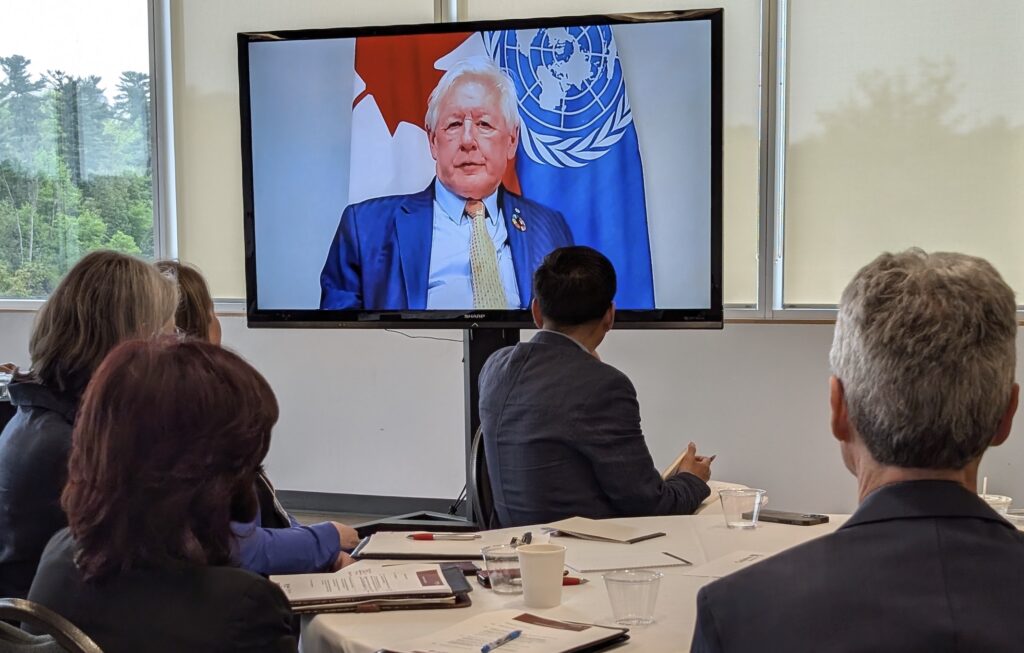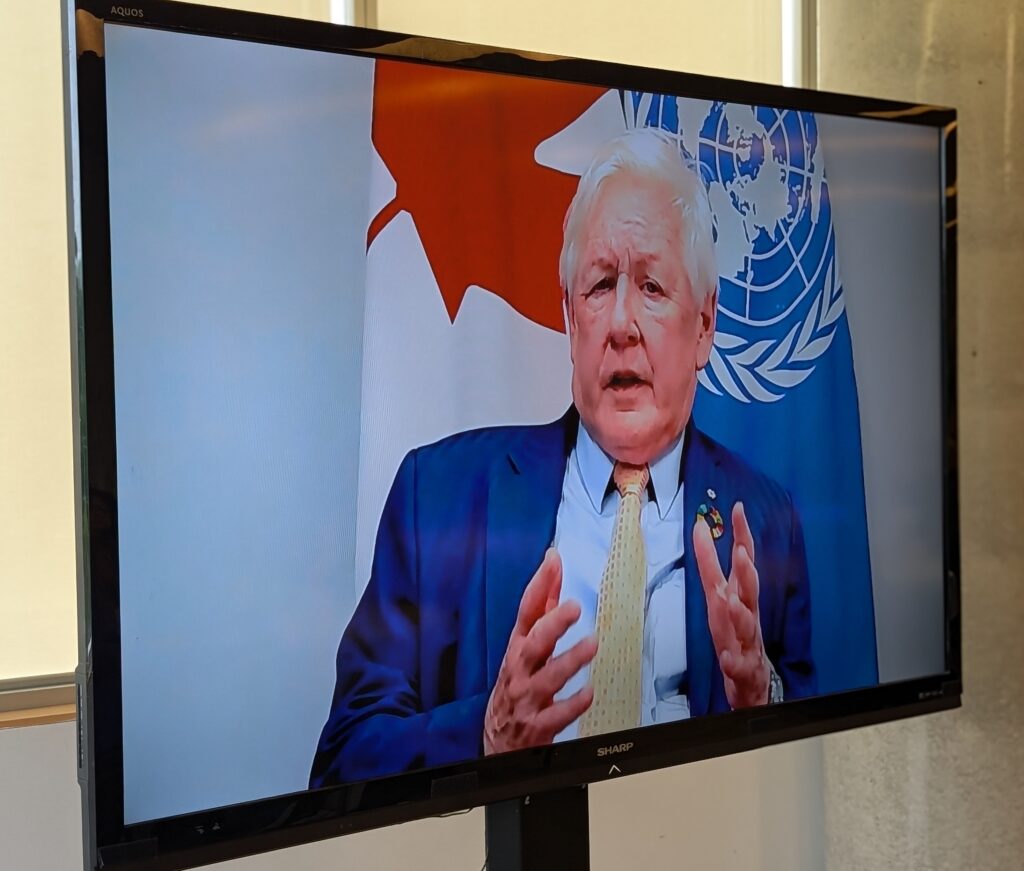
Bob Rae, Canada’s Ambassador to the United Nations, had some blunt messages for conference participants when he delivered a special address via video link from New York to the Scholars at Risk gathering at Carleton University on May 22.
“Governments fear academic freedom,” said Rae, the former Ontario NDP premier and former interim federal Liberal leader, who is also currently serving as president of the UN Economic and Social Council. “Authoritarian governments fear institutions that insist on being free and freestanding and able to resist the power of politics, the power of authoritarian governments.”
Rae said the quest for academic freedom has been a long battle in many Western democratic countries and institutions. And he pointed to “terrible irony” of events unfolding on the very day of his address to highlight the fragility of academic freedom in the present era.
Rae put a spotlight on the decision by the administration of U.S. President Donald Trump to ban Harvard University from enrolling international students — a response to the Cambridge, Massachusetts-based school’s refusal to divulge visa information about its foreign students to the U.S. government. The clash over foreign students — who account for about one-quarter of Harvard’s student population — follow previous conflicts between the prestigious Ivy League university and the Trump administration over the centuries-old institution’s governance, alleged “ideological” indoctrinating of students and purported failure to vigorously combat antisemitism on its campus.
“President Trump has done that because Harvard has exercised its academic freedom in telling the government of the United States that he cannot dictate their policies on diversity, equity, and inclusion,” said Rae. “They refuse to do what he wants and expects them to do. So this is just another escalation of the battle.” In a bid to prevent the ban on international students, Harvard promptly sued the Trump administration.
Rae, Canada’s UN ambassador since August 2020, emphasized the importance of preserving academic freedom at a time when governments and institutional pressures continue to make that freedom uncertain. He said the historic commitment of educational institutions to the “sacred” principle of intellectual freedom has been key to universities maintaining “their ability to withstand the impact of political interference.”
Though deeply rooted in history, the struggle to uphold academic freedom is very much a contemporary fight, Rae warned.
“This is not some medieval battle. This is not some battle of the 19th century about the emergence of modern science and how modern scientists insisted on their right to tell the truth as they found it.
“The key thing to remember now is it’s a battle that’s still ongoing. In fact, it’s even more intense and significant, because the country that has the largest number of great universities in the world — the United States — is right now engaged in a systematic attack on academic freedom. And it is what authoritarian governments do.”
— Hon. Bob Rae, Ambassador of Canada to the United Nations
“The key thing to remember now is it’s a battle that’s still ongoing,” he continued. “In fact, it’s even more intense and significant, because the country that has the largest number of great universities in the world — the United States — is right now engaged in a systematic attack on academic freedom. And it is what authoritarian governments do.”
As a cautionary tale, Rae referenced the battle waged by his long-time friend and former Liberal Party colleague Michael Ignatieff, the Canadian scholar who experienced and then chronicled the attacks by Hungarian Prime Minister Viktor Orbán on the Central European University — and its eventual expulsion from Budapest in 2019 — during Ignatieff’s presidency of the institution. At the time, Ignatieff condemned the Hungarian government’s “unacceptable assault on our academic freedom,” and he was later awarded the prestigious Dan David Prize for his efforts to defend democratic values and the independence of scholarship.
“That university,” said Rae, “was basically thrown out of Hungary by (Prime Minister) Orbán because he saw it as a direct threat to his ability to control thought, control the direction of academic thinking in his country. And he didn’t want foreign students, and he didn’t want other people hanging around and infecting the rest of the society with democracy, with what the democracy intended.”
In individual terms, Rae said academic freedom is about scholars pursuing knowledge “according to their own conscience and according to their own determination” — a message well framed for a conference dedicated to strengthening Canadian support for scholars at risk from around the world.
Underlying the principle of academic freedom, he added, is the idea that the pursuit of knowledge is valuable for its own sake — not because it’s useful for a particular government or any other centre of power in society.

Freedom to ask questions, to take an independent view, and to express dissent must be protected by societies, said Rae. When people who speak up are unprotected, a “climate of fear” is quickly created, he added.
“The degree of a real dissent and dissonance becomes more and more restricted — and so restricted that, in fact, you have to say it doesn’t exist, because anybody who puts their hand up will either be killed or arrested,” said Rae, explaining how quickly fear can turn into authoritarian oppression. “This is not alarmism when I say these things. This is actually happening.”
Rae emphasized the importance of scholars being free to pursue their inquiries, to subject hypotheses to experiment, peer review and critical feedback.
“The only real way to be able to pursue knowledge is by being free, by having the ability to pursue it in your own way and to be tested,” Rae said. “Not by a government bureaucracy that says, ‘This is not OK’ or ‘This is OK’ but by a group of peers who say, ‘We think it’s OK, but it’s not that good and you could improve it.’”
“An academically free institution is one where not everybody has to have the same ideas and the same thoughts. In fact, quite the opposite. We want to see more diversity of thought, more the ability of people to express themselves in different ways, provided the climate in which that is done is a civil climate.”
— Hon. Bob Rae, President of the UN Economic and Social Council
Though truth may never be uncontested, Rae said he believes there can be things that are truer than others. However, freedom is not threatened by contested truths, but by conformity, he said.
“The pursuit of knowledge and the pursuit of truth is different from the pursuit of certainty,” he said. “Certainty is all about conformism, and certainty is all about people having to line up and swear an oath and having to say, ‘This is what we know and this is what we do.’ The pursuit of freedom is of a very different value than the pursuit of certainty.”
Rae emphasized how “critically important” it is to respect a diversity of views, even what might be considered incorrect ones, saying that is what defending academic freedom is all about.
“An academically free institution is one where not everybody has to have the same ideas and the same thoughts. In fact, quite the opposite,” he said. “We want to see more diversity of thought, more the ability of people to express themselves in different ways, provided the climate in which that is done is a civil climate.”
He added: “I need to put myself on the side of the people who believe that academic freedom is important to allow people to say things that are unpopular, that many people don’t like, that many people don’t agree with, that many people don’t think should be allowed to be said. And I think we all know that those are the times and the places where we need strong institutions to really protect people.”


